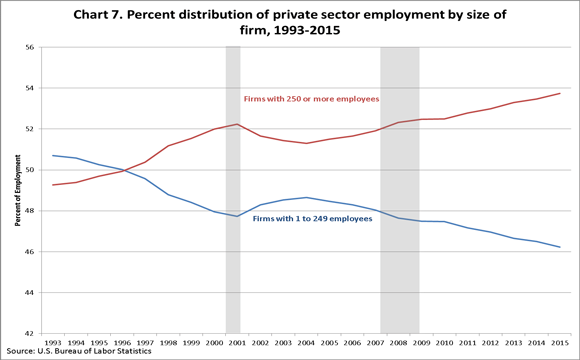For a long while, American business culture has worshiped at the altar of big. Entrepreneurs want to build “big” companies, because they believe that’s how they prove their worth. The media tells us that’s true when they report on every move made by big companies, but barely cover small ones. Speakers on stages and webinars reinforce it when they talk about how Amazon, Google, Facebook, and Apple added another $100M in revenue, but not how small businesses added another $10,000.
In the startup and tech worlds, powerful investors who control the pursestrings, intros, event invites, stages, and M&A activity use the phrase “lifestyle business,” to describe anyone and everyone not killing themselves and sacrificing their happiness and the lives of their employees to gamble on the low odds of building a “unicorn.” F&$% that noise.
We need to stop glorifying the giants and start boosting the founders, teams, customers, and products of small companies. Early this year (before the pandemic), I filmed an episode of Paul Campillo’s Meaningful for the online survey maker, Typeform, on just these topics. If you’ve followed this blog, I think you’ll enjoy.
I hate shopping at chains. I avoid national and international brands as best I can. I love shopping locally, small. I’ll use Amazon when I have to, but Etsy or niche online retailers whenever I can. That’s not just about personal preference, but about fighting against income inequality and the accumulation of gains by the already-wealthy at the expense of everyone else.
If you’re in the tech world, it might feel like the last twenty years have been a startup boom, but in reality, the opposite has occurred. New companies and small companies make up a smaller share of the American economy than at any time in the last fifty years.

Source: Washington Post
New & small have been fighting a losing battle against big, well-funded, and politically-connected for my entire life. Today, new & small employ fewer people, succeed at lower rates, and contribute smaller shares to the US economy than at anytime since the Great Depression.

Source: US Bureau of Labor Statistics
This is bad for everyone. It exacerbates inequality. It leads to rent-seeking behavior. It diminishes competition and, by extension, innovation. It results in a few companies and people having far more power and wealth than is reasonable or deserved. We should all, no matter our political views or wealth levels, be fighting against this brutal trend.
That’s why I’m so passionate about:
- Amplifying case studies of small businesses doing remarkable things in product, marketing, and growth
- Supporting entrepreneurs who don’t want to build the next Facebooks and Googles, but rather build companies that choose to be great instead of big.
- Encouraging new companies NOT to get venture funding, which intentionally builds portfolios where 2-3 out of 100 investments “win,” while everyone else goes under.
- SparkToro’s funding structure, which enables a new type of investment that lets both founders and investors do well as a company profitably grows.
- Building products that help small+new businesses find their audiences and build their marketing engines outside of Google’s and Facebook’s duopoly on online advertising.
The startup world, the business world, the media ocean we all swim in… they push you HARD to believe you’re not a “success” unless you build (or work for) a big company.

That’s wrong. Don’t fall for it.
You can build a business that’s designed around what you want to build, what you want to see more of in the world, and what’s more likely to get off the ground and persist. And, no matter who you are or how you contribute to the world around you, you’ve got the choice of supporting and amplifying the work of small, independent organizations.
P.S. In addition to the video from Paul and Typeform, I’d also give a nudge to Lee LeFever’s upcoming book: Big Enough, about “building a business that scales with your lifestyle.”
